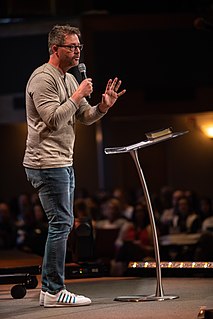A Quote by Pope Benedict XVI
The proclamation of the Gospel remains the primary service that the Church owes to humanity, to offer the salvation of Christ to the man of our time, who is in many ways humiliated and oppressed, and to orientate in a Christian way cultural, social, and ethical transformations that are unfolding in the world.
Related Quotes
Although the church accomplishes many tasks, its only message to the world is the gospel of Christ. Everything else we do is merely an extension of that primary goal. The gospel we offer the lost is superior to every worldly philosophy. Never outdated or in need of correction, it is always sufficient to meet humanity's greatest need: reconciliation with the Creator.
While our heart for social justice grows out from the gospel, social justice by itself will not communicate the gospel. We need gospel proclamation, for as much as people may see our good deeds, they cannot hear the good news unless we tell them. Social justice, though valuable as an expression of Christian love, should, especially as a churchwide endeavor, serve the goal of gospel proclamation.
I thank Missio, (Pontifical Mission Societies), the primary instruments for cooperation in the universal Church's universal mission in the world. Through their action, the proclamation of the Gospel bears witness to Christ and is lived out in service of our neighbour through justice for the poorest, education in isolated villages, medical care in remote areas, freedom from poverty, the reintegration of the marginalised, support for the development of peoples, the breaking down of ethnic divisions and respect for life in all its stages.
For every Christian, the proclamation and witnessing of the Gospel are never an isolated act. This is important. For every Christian the proclamation and witnessing of the Gospel are never an isolated or group act, and no evangelizers acts, as Paul VI reminded very well, "on the strength of a personal inspiration, but in union with the mission of the Church and in her name"
Christianity is NOT a religion; it is the proclamation of the end of religion. Religion is a human activity dedicated to the job of reconciling God to humanity and humanity to itself. The Gospel, however - the Good News of our Lord and Savior, Jesus Christ, is the astonishing announcement that God has done the whole work of reconciliation without a scrap of human assistance. It is the bizarre proclamation that religion is over - period.
I grew up in a Christian home, but was nearly 17 before I realized I had to make my own decision to place my trust in Christ. Salvation cannot be earned by doing good works or going to church, and can't be automatically passed on from Christian parents. Salvation is a free gift from God, who sent His Son Jesus Christ to die in our place.
Let us be today's Christians. Let us not take fright at the boldness of today's church. With Christ's light let us illuminate even the most hideous caverns of the human person: torture, jail, plunder, want, chronic illness. The oppressed must be saved, not with a revolutionary salvation, in mere human fashion, but with the holy revolution of the Son of Man, who dies on the cross to cleanse God's image, which is soiled in today's humanity, a humanity so enslaved, so selfish, so sinful.
The Christian life is not just our own private affair. If we have been born again into God's family, not only has he become our Father but every other Christian believer in the world, whatever his nation or denomination, has become our brother or sister in Christ. But it is no good supposing that membership of the universal Church of Christ is enough; we must belong to some local branch of it. Every Christian's place is in a local church. sharing in its worship, its fellowship, and its witness.
The identity of just one thing, the "clash of civilization" view that you're a Muslim or a Hindu or a Buddhist or a Christian, I think that's such a limited way of seeing humanity, and schools have the opportunity to bring out the fact that we have hundreds of identities. We have our national identity. We have our cultural identity, linguistic identity, religious identity. Yes, cultural identity, professional identity, all kinds of ways.
I would not send my child to a vacation Bible school in 99.9% of the Baptist churches in America. Have some teacher that doesn't even understand anything about the gospel of Jesus Christ, ask those little children, 'How many of you want to go to Heaven?' and damn most of them! Harden their heart to the gospel with some silly profession of faith because it was a silly proclamation of the gospel! It brought no genuine repentance, it brought no faith; it's no different than the Roman church that baptizes every infant that is born.

































